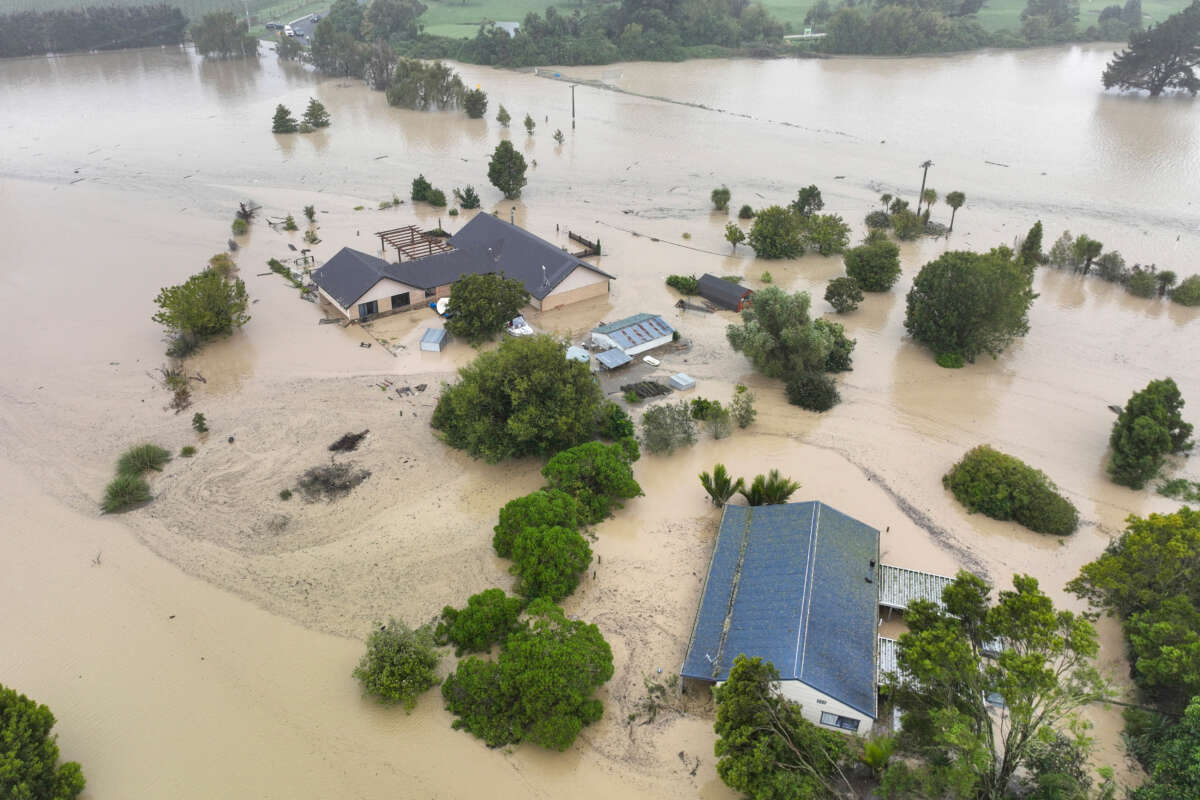New Zealand is under a declared national emergency Tuesday as flood waters and heavy winds from Cyclone Gabrielle battered the island with all the hallmarks of a storm made more intense by the climate crisis by causing severe flooding, mudslides, and cut off power for at least a quarter of a million people.
The North Island took the brunt of the storm, with massive flooding in Hawke’s Bay on the east coast and areas north-west of Auckland reporting major power outages and residents scrambling to escape with their lives.
Prime Minister Chris Hipkins said the cyclone was “the most significant weather event New Zealand has seen in this century,” as he explained the need for the emergency declaration, only the third time in the nation’s history one has been issued.
“The severity and the damage that we are seeing has not been experienced in a generation,” Hipkins said. “We are still building a picture of the effects of the cyclone as it continues to unfold. But what we do know is the impact is significant and it is widespread.”
According to the BBC:
About a third of the country’s population of five million people live in affected areas.
Many people are displaced and some were forced to swim from their homes to safety after rivers burst their banks.
Others have been rescued from rooftops.
About a quarter of a million people are without power. Falling trees have smashed houses, and landslides have carried others away and blocked roads.
Hawke’s Bay, including the city of Napier, was hit especially hard with reports of people trapped on rooftops, surrounded by raging water, for hours while they awaited rescue.
Adrianne Mason, of Esk Valley, told The Guardian that her 22-year-old daughter had to climb out of her bedroom window in the middle of the night and swim to safety as flood waters rose. Mason described other neighbors in the area trapped on their roofs amid flooding she described as “catastrophic.”
Footage on social media showed swollen rivers overwhelmed bridges:
On the floor of New Zealand’s parliament, climate minister James Shaw, leader of the nation’s Green Party, unleashed a fiery oratory against the decades lost in the fight to curb emissions and curb the onset of global warming.
He said it was not “too soon” to make it clear that the devastation being witnessed was directly related to soaring global temperatures. “This is climate change,” he declared.
“As I stand here today, I struggle to find words to express what I am thinking and feeling about this particular crisis,” Shaw said.
“I don’t think I’ve ever felt as sad or as angry about the lost decades that we spent bickering and arguing about whether climate change was real or not, whether it was caused by humans or not, whether it was bad or not, whether we should do something about it or not,” he continued, “because it is clearly here now, and if we do not act, it will get worse.”
“We need to stop making excuses for inaction,” Shaw added. “We cannot put our heads in the sand when the beach is flooding. We must act now.”
Join us in defending the truth before it’s too late
The future of independent journalism is uncertain, and the consequences of losing it are too grave to ignore. To ensure Truthout remains safe, strong, and free, we need to raise $43,000 in the next 6 days. Every dollar raised goes directly toward the costs of producing news you can trust.
Please give what you can — because by supporting us with a tax-deductible donation, you’re not just preserving a source of news, you’re helping to safeguard what’s left of our democracy.
